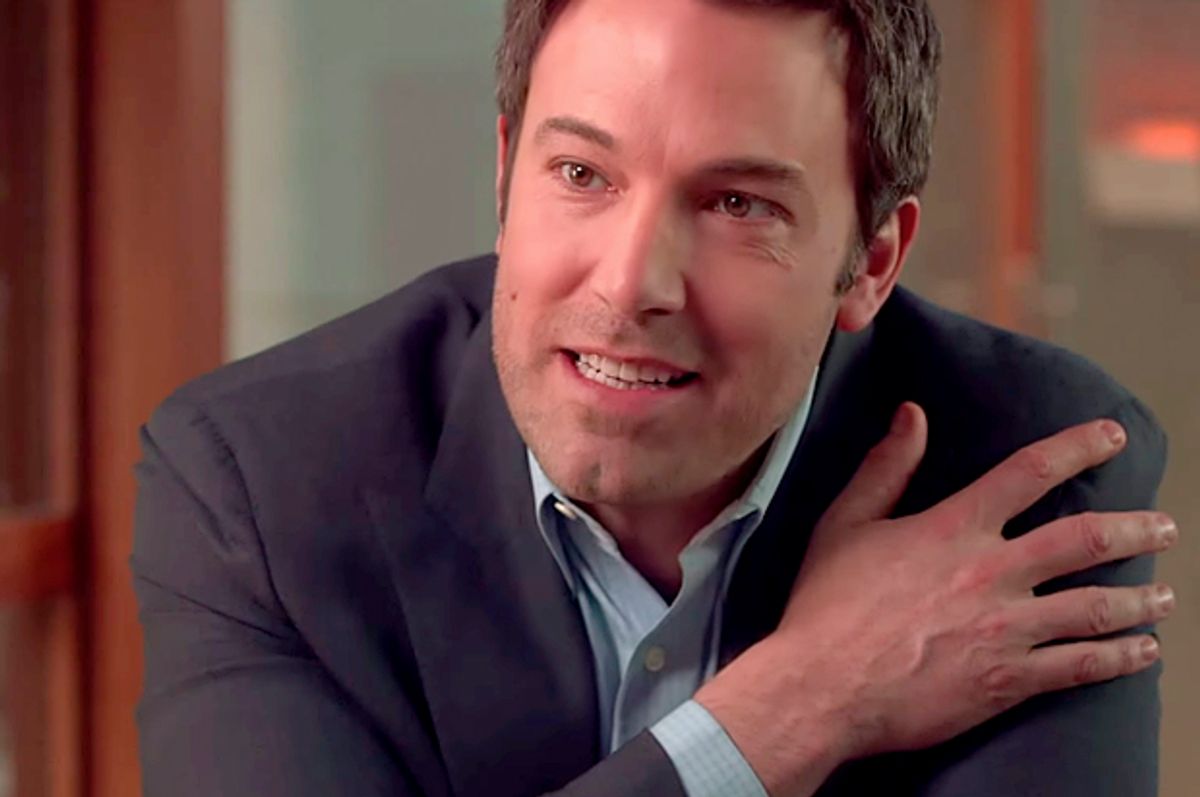Let me get this straight — the guy who did "Gigli" and "Jersey Girl" decided this was what he was going to be embarrassed about? A relative who lived a century before he was born? Even after Ben Affleck's peculiar statement about the recent dustup over his segment in "Finding Your Roots," it's not the Oscar winner's family tree that should be a source of shame. And at this point, if there's any embarrassment to be had, it should be shouldered primarily by PBS.
In the latest revelation from the ongoing Sony hacking scandal, it was disclosed earlier this week that during the course of Affleck's participation in Henry Louis Gates' ancestry PBS series "Finding Your Roots," the actor was dismayed to learn a family member had been a slave owner. In an email to Sony chief Michael Lynton, Gates said that "For the first time, one of our guests has asked us to edit out something about one of his ancestors…. We’ve never had anyone ever try to censor or edit what we found. What do we do?… To do this would be a violation of PBS rules, actually, even for Batman." Lynton then diplomatically replied that "All things being equal I would definitely take it out," and the episode aired without any nod to that aspect of Affleck's family history.
When the news of the apparent yielding to a the star's wishes was made public, Gates issued a statement defending the structure of the episode, saying, "We focused on what we felt were the most interesting aspects of [Affleck's] ancestry," and PBS added its own statement that "The range and depth of the stories on ‘Finding Your Roots’ speak for themselves." Then Tuesday, Affleck himself chimed in, in a Facebook post in which he admitted, "I didn't want any television show about my family to include a guy who owned slaves. I was embarrassed. The very thought left a bad taste in my mouth…. Skip decided what went into the show. I lobbied him the same way I lobby directors about what takes of mine I think they should use." But while he insisted, "It's important to remember that this isn't a news program," he also concluded, "I regret my initial thoughts that the issue of slavery not be included in the story. We deserve neither credit nor blame for our ancestors and the degree of interest in this story suggests that we are, as a nation, still grappling with the terrible legacy of slavery." Funny how he doesn't seem to be communicating any of that awareness in the episode, as his pal Skip tells him about his Revolutionary War veteran ancestor, saying, "You are descended from a patriot." Guess they felt it wouldn't have gone over as well if he'd said, "You are descended from a person who owned people." And what's really fascinating is that in the same episode, Gates actually does tell another participant — African American actress Khandi Alexander — that an ancestor of hers was a white slave owner. As he explains, that would make her forbearer "both the master and the father" of Alexander's ancestor. And she declares, "I don't hate anyone. I understand history as it was…. I'm grateful that I'm here right now with all of this inside me." That's a wise and mature response to the very complicated and no doubt painful legacy that many, many of us as Americans carry within our DNA.
PBS and WNET, meanwhile, are now launching their own "internal review" of the flap. A PBS ombudsman said Tuesday, "Any serious program about genealogy, especially dealing with celebrities, cannot leave out a slave-owning ancestor. It also seems clear from the emails that Gates knew the stakes involved in terms of PBS credibility yet went with the advice from the Sony executive to squelch the factoid about a slave-owning ancestor and try to keep it quiet."
It's good that PBS is looking squarely at the situation and trying now to do damage control with a degree of integrity, but the entire fiasco should serve as a reminder that public media is as vulnerable to celebrity butt kissing as any other aspect of the entertainment industry. It's scrambling for our eyeballs and attention just like everybody else, and as prone to being seduced into placating a movie star as the studios are. We like to hold it to a higher standard because of all the Ken Burns stuff and the costume dramas with actors with fancy accents. Maybe we needed a reminder that the distance between "Frontier House" and "Duck Dynasty," between "America's Ballroom Challenge" and "Dancing With the Stars, " are not as great we may think. And that classy is not the same as ethical.



Shares